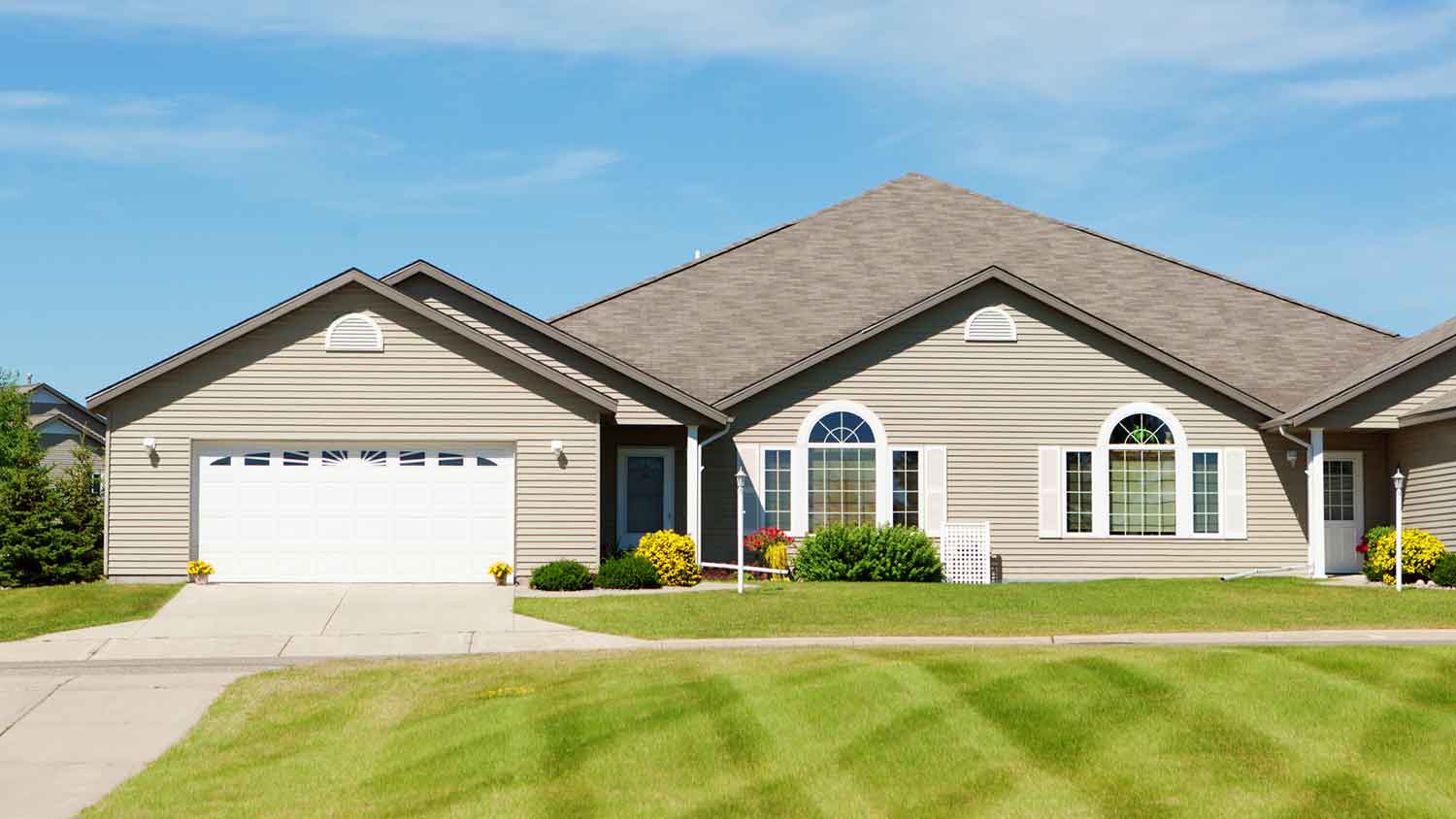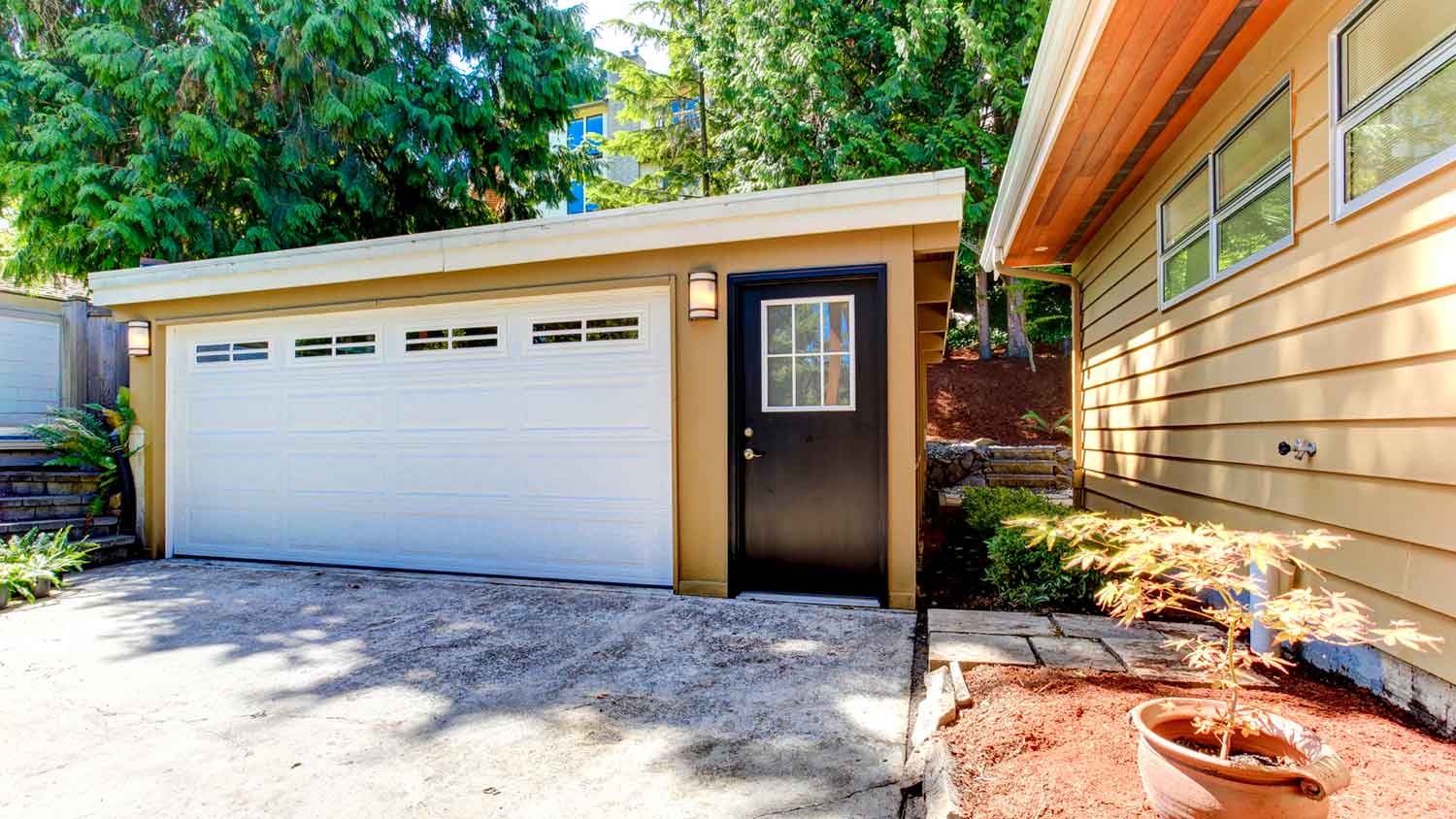Attached vs. Detached Garages: Pros, Cons, and Costs
Choose your own adventure: garage edition


The main difference between attached and detached garages is their proximity to the main home.
Attached garages are often less expensive to build than detached garages.
Detached garages may be inconvenient during inclement weather.
If you’re considering building a new garage, you may wonder about the pros and cons of attached vs. detached garages. Both come with their own price points, parking perks, construction timelines, and convenience. You should also consider whether you want more privacy or extra living space. Before you decide between an attached or a detached garage, it’s important to know the differences that make each type unique.
Attached vs. Detached Garage: Key Differences
The main distinction between an attached garage and a detached garage is their physical connection to the house. An attached garage is literally attached to the house, often sharing a common wall and making it easily accessible from inside your home. On the other hand, a detached garage is a standalone structure that doesn’t make contact with your house, so you’ll have to step outside to access it.
What Is an Attached Garage?

An attached garage is directly connected to the main residence and shares a common wall. This type of garage provides convenience for residents with its easy accessibility from within the home and offers shelter from the outdoor elements you need to get to your vehicle.
| Pros | Cons |
|---|---|
| Convenient | Ventilation issues |
| Secure | Limited privacy |
| Utility access | May limit home square footage |
| Cost-effective | May require you to climb stairs to access |
Best for:
Homeowners who prioritize direct access to their vehicles and belongings.
Properties with limited land space.
Homeowners who are concerned about security.
Pros of Attached Garages
A significant benefit of an attached garage is the convenience of allowing easy access to the garage directly from the home. This becomes particularly valuable during adverse weather conditions, ensuring residents can enter and exit the garage without exposure to the elements. The attached nature of these garages enhances security and privacy by offering a seamless connection to the main residence.
The integration of utilities is simplified in attached garages, as they share a wall with the main house. This makes it easier to connect electricity, water, or heating systems. They're also considered more cost-effective because the shared wall may reduce construction costs.
Cons of Attached Garages
One of the most notable downsides of an attached garage is poor ventilation due to the shared structure, which can compromise your home’s air quality if fumes creep in. You’ll need to make sure your attached garage has proper ventilation. Loud engine noises or music from your work station will also make their way into your home.
Attached garages may also stifle your ability to get creative with design, since you have to work around your home’s footprint. This means you may have to opt for a smaller garage size. Local building codes and regulations may also restrict the construction and design of attached garages.
What Is a Detached Garage?

Unlike an attached garage, a detached garage is not physically connected to the home and is a standalone structure on the property. This type of garage offers many advantages in terms of flexibility in design, location, and space utilization.
Although accessing them requires you to step outside, they offer the added advantage of reduced noise transfer to the main house and more privacy.
| Pros | Cons |
|---|---|
| Design flexibility | Less convenient accessibility |
| Private | Security concerns |
| Reduced ventilation concerns | Higher cost |
| Multi-functional use | Limits outdoor space |
Best for:
Homeowners seeking a versatile space separate from the main house.
Reducing noise transfer from activities completed in the garage.
Homeowners concerned about fumes from vehicles and other machines.
Pros of Detached Garages
With detached garages, homeowners can select from various architectural styles and position the garage on their property according to their preferences. This freedom adds a touch of uniqueness and sophistication to their homes, as homeowners aren't limited to copying the style of their homes and can instead find a style that complements it.
Their standalone nature also means extra privacy. The distance between the main dwelling and the garage ensures that activities and noise within the garage are less likely to intrude on the peace and quiet of your living space.
You don’t have to worry too much about fumes in the home, either. This benefit is especially helpful if you use the garage as a workspace or studio. You can also go bigger with a detached garage because a standalone space could hold 3-car garage dimensions. On the other hand, an attached garage could be restricted in space to only holding 2-car garage dimensions or even limited to a one-car garage size.
Cons of Detached Garages
You might find the distance between the detached garage and your home inconvenient. This could be particularly pesky during bad snow, rain, or hot days. Limited accessibility is a concern, especially if you have mobility challenges.
The cost of building a detached garage can be higher than an attached one, considering the need for a separate foundation, roofing, and utility connections. A detached garage uses valuable outdoor space that may restrict yard space or limit other potential property uses, impacting overall space utilization.
Some homeowners worry more about security with a detached garage since its isolated location may tempt trespassers.
Detached vs. Attached Garages

Now, let’s take a look at which garage type comes out on top for appearance, customization, price, and more.
Appearance: Tie
Architectural styles, materials, and landscaping choices play a significant role in determining the visual appeal of a garage, regardless of its attachment status. Both attached and detached garages can boast exceptional appearances. The location of the garage doesn't necessarily make a difference in its appearance.
Options and Customization: Detached
Detached garages pose a slight edge regarding customizations because there are fewer restrictions. While an attached garage must be designed to fit within the style and space of the house, a detached garage does not.
Durability: Tie
Both types of garages can be equally durable if well-built and properly maintained. An attached garage shares a wall with the main house, potentially offering some protection from the elements, but may be subject to structural considerations related to the house. A detached garage is more exposed to weather conditions, but not influenced by any of the house’s structural issues.
Price: Attached
Because an attached garage is built alongside the main home, it requires fewer building materials and labor. Plus, it can conveniently hook up to the home's utility system. A detached garage, in comparison, requires a separate build, more materials, and its own utility system.
When hiring a local garage builder, the average cost to build a garage ranges between $16,530 and $40,860. A detached garage varies between $19,200 and $33,600 on average and is about 10% to 15% more expensive than building an attached garage.
Maintenance: Attached
Attached garages are simpler to maintain because they share a structure with the main house, providing added protection from the elements and wear and tear. In addition, utilities and services are more accessible. The ease of maintenance, however, depends on the construction quality, materials, and garage layout. Detached garages offer easier exterior access but may require additional attention due to exposure to the elements.
Resale Value: Tie
The resale value between an attached garage or detached garage varies greatly based on the local real estate market and buyer preferences in the area. In some regions, attached garages might be more desirable, while detached garages could be considered attractive in others. These preferences also aren't set in stone, so even assessing current trends can result in a different trend a few years down the road.





- Attached vs. Built-In Garages: What Are the Differences?
- How To Build A Garage: Full Guide from Planning to Finish
- One-Car Garage Sizes: A Guide to Standard Dimensions
- Garage Sizes: A Complete Guide to Average Dimensions
- How Long Does It Take to Build a Garage?
- Who Do I Call to Install Power in My Garage?
- Small Garage Ideas: Tips to Improve the Space
- How Much Value Does a Garage Add to a Home?
- Who Can I Hire to Finish a Garage?
- 2-Car Garage Dimensions: A Complete Guide to Standard Sizes










